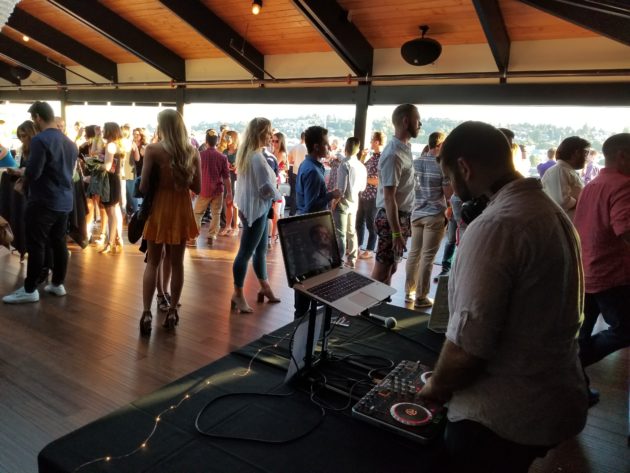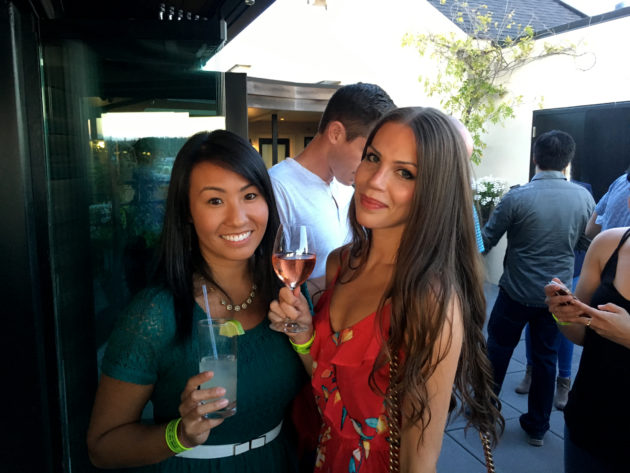
Single people in Seattle aren’t satisfied with dating apps, but use them anyway. The men are too passive; the women too flaky. And the city is being taken over by transplants.
Those are some of our takeaways after attending The League’s launch party on a warm summer evening Wednesday at the Olympic Rooftop Pavilion in Ballard.
The League, as GeekWire reported last week, is a technology-powered dating service that uses a highly-selective admissions-based model to screen potential users. Founded in 2014, the startup differentiates itself from the bevy of dating apps with a vetting process that scrutinizes a candidate’s education, career, and ambition. Some describe the app as “elitist,” but many like how it helps match like-minded people, some of whom have found romance and marriage via the service.

Before it officially launches next week in Seattle, The League hosted an exclusive party for some of its users. It received 9,534 applicants and accepted 2,005 people in the Emerald City. We got an invite to the event and spoke with several of Seattle’s singles, who ranged from engineers to teachers to marketers. It was fun playing The League’s networking game and hearing why people are interested in using the service.




The crowd was surprisingly diverse — although everyone we met was a college-educated working professional, a wide range of interests, ethnicities, and sexual orientations was represented. We also enjoyed our conversations — people were nice and didn’t really give off an “elitist” vibe.
Amanda Bradford, The League founder’s and CEO, said she’s optimistic about the service taking off in Seattle after attending the party.
“This has been one of the best,” she said. “You can tell by these parties how well a community will do on the app. It’s a testament to the fact that there’s a need for people who want to meet new people.”
After chatting with the young professionals who attended the party, a few themes about the city’s single scene, dating apps, and modern romance emerged. Here’s what we learned.
Seattle singles have mixed feelings about ‘elite’ dating

The League has taken more than a little heat for its rigorous screening process, which selects for highly educated and ambitious people. Attendees of the Seattle launch party were well aware of the app’s dubious reputation.
“The elitism kind of annoys me,” said Zach Leonardi, a marketing professional for Expedia. “I think there’s a lot of really incredible people who might not fit the mold that I think the app is selecting for. So I have some hesitancy, but then again, if it can help me fight the good fight and find true love, then that loss percentage is probably worth it in the long run, rather than endless pointless dates and swiping.”
Most people we talked to echoed Leonardi, saying that The League’s admissions process doesn’t make them feel warm and fuzzy, but it’s a necessary evil when looking for like minded people. All is fair in love and war?
John Prosser, a 37-year-old middle school teacher from Tacoma who was previously married and has three kids, said he agreed with Bradford’s idea that companies and universities could be described as “elitist” because they screen applicants and don’t accept everybody.
“We curate everything else in life, like our schools or our jobs,” Prosser said. “Why should dating be any different?”

Not everyone at the party found the reputation for elitism objectionable.
“I like it,” joked Elle Cameron, who also works in marketing. “It’s why we’re looking for that app. We wouldn’t be trying to get on if we weren’t interested in that. I would go somewhere else, but I also feel like for me, education is really important and if you have to have a college degree, I don’t think there’s anything wrong with that.”
Cameron is a transplant from Los Angeles who finds stereotypes about her new city’s dating scene — like the Seattle Freeze — to be surprisingly accurate. There’s also a small pool of contenders, she said, noting that “I just got approached by someone that I have a date with on Sunday from Bumble.”
Seattle is becoming a transplant city

The data shows that Seattle is the fastest-growing big city in the country, with more than 1,000 new people are moving here every week. Those trends were confirmed at the party — nearly everyone we talked with had only lived in Seattle for a few years.
“Everyone is dressed very nicely and is well put-together,” said Liz DeVleming, who grew up in Seattle and returned after college. “They are mingling with each other and speaking words a little bit more than usual. It’s very un-Seattle like.”
That may bode well for The League, which caters to folks with impressive educational backgrounds and those who have demanding jobs — the booming tech industry in Seattle certainly has no shortage of that.
“We get the impression that there are lots of transplants looking to meet new people,” said Brianna Haag, head of events for The League. “People in Seattle are ready for something like The League.”
But Prosser said that the changes in Seattle can make dating tough, with people moving in and out so much and new businesses coming and going.
“We don’t have the tradition you get in other cities,” he said.
Seattle dating is app-centered, but people are tired of existing options

Everyone we met at the launch party was already using at least one other dating app. The most popular apps that came up were Bumble and Tinder.
“Dating apps are the only way to meet people here,” said Paul Gambill, an entrepreneur starting a business to explore ways to incentivize people to reduce their carbon emissions. “Although it doesn’t seem very effective. I’ve been using them for about four or five years and things have gone up and down but for the most part, it seems like everyone flakes.”
The League uses the hashtag #GetMeOffTinder to advertise its service, which serves up only a handful of curated potential matches to users each day. Paul, an executive for SAP, said it “resonates really well with me.”
“This one sounds interesting,” he said. “It’s different. I’m hoping that I have more in common education-wise and career-wise with people I meet here, but who knows.”

A common complaint about existing dating app options was the legwork required to make a worthwhile connection and actually meet up in person. Helping alleviate that process is part of the value proposition of The League, which said 30 percent of its matches end up meeting offline.
“It takes so much legwork to get to the first date,” said Shoumi Jeyarajah, an engineer at Boeing. “If you can narrow all the noise and figure out who is compatable, it makes things a bit easier.”
Others said the low barriers to entry for apps like Tinder and Bumble lead to flakiness and wasted time.
“It just takes a lot of patience and you get a ton of weirdos and freaks,” said Kathy Sullivan, an industrial engineer. “It’s just like, what is the point of this?”
Added Sullivan: “I feel like a lot my friends, guys and girls, just go on Tinder to swipe so they can feel good about themselves.”
When it comes to dating, Seattle is an outlier

It seems everyone had an opinion on what it’s like to date in Seattle. Rohan Khanduja, a 31-year-old program manager at Amazon, sees a lot of differences from when he was dating in New York City before moving to Seattle.
“It’s easier there and people want to go out,” he said. “In Seattle, it’s more texting. There are more levels. I’m not used to it — I’m more of a talkative person rather than texting.”
DeVleming said it’s hard for women in Seattle to date. She said men are too shy.
“The traditional way doesn’t happen in this city,” she said. “If you wait for it to happen, it just doesn’t happen.”
The quirky dating scene is one of the reasons Bradford, The League’s CEO, thinks the app will do well in Seattle.
“It sounds like Seattle is suffering from a lot of the same ailments San Francisco is, where people tend to go out with friends, meet their friends of friends,” she said. “If you have a very well-connected single socialite friend, good for you, but if I don’t, I don’t have many options. I’m hoping that by incorporating this into the culture, there will at least be another avenue to meet people if your group of friends aren’t the best matchmakers.”

Seattle presents a unique challenge for the app. The League automatically filters out co-workers when you join, to avoid any awkward interactions on the app. With so many of Seattle’s young people concentrated at two big employers — Amazon and Microsoft — that feature reduces the dating pool quite a bit.
But Bradford doesn’t plan to make any changes to that feature for the Seattle market. Instead, The League is thinking about throwing an Amazon-Microsoft happy hour so people mix and mingle.
“There are so many women working in these tech companies surrounded by men … the last thing I want is for them to be faced with an awkward situation — do I swipe right on my boss?” she said. “If you’re at Microsoft, you can date the Amazon engineer, not the Microsoft engineer.”
Expanding the dating pool beyond’s one workplace is appealing to Paola Lopez, an engineer at Microsoft.
“We’re always with Microsoft people — we work with each other, we have lunch, we go out together,” she said. “We’re all fairly similar. It’s good to expand your horizons.”
Given the rush of transplants, the dating scene, and the tech-friendly culture, there seems to be a unique window of opportunity for The League in Seattle, which started in three cities — New York City, San Francisco, Los Angeles — before expanding to ten other metros this summer.
“We have lots of users asking our customer support to have their cities changed to Seattle,” Bradford said. “We almost got forced to launch here by our current users. That’s when you know you should expand.”



